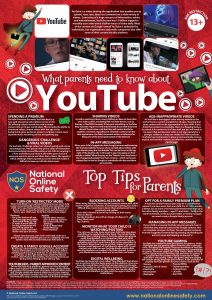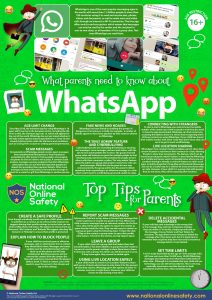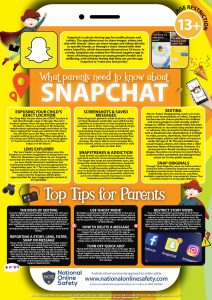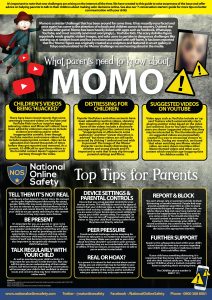Internet Safety – Parents and Carers
Safer Internet Day – 7th February 2023
Safer Internet Day is a global campaign to promote the safe and
responsible use of technology, which calls on children and young people,
parents, carers, teachers, social workers, law enforcement, companies,
policymakers and more, to help to create a better internet.
Using the internet safely and positively is a key message that we promote
in school/our group/our club, and celebrating Safer Internet Day is a great
opportunity for us to re-emphasise the online safety messages we deliver
throughout the year.
We would be delighted if you could join us in celebrating the day by
continuing the conversation at home. To help you with this, the UK
Safer Internet Centre have created some free activities and information
for parents and carers which are available at: saferinternet.org.uk/
Whether you have 5 minutes to start a conversation or hours to spare,
there are top tips, quizzes and films which you can use at home with
your child.
If you have any concerns or questions about keeping your child safe
online, please do get in touch with your child’s class teacher or
Craige Young or a member of our SLT.
Here are the powerpoints we used in our Internet Safety Day assemblies and some other resources you might like to use:
Our Assemblies:
Safer-Internet-Day-2023-Assembly-for-3-7s
Safer-Internet-Day-2023-Assembly-for-7-11s
Some Resources to Use:
Safer-Internet-Day-2023-Resources-for-3-7s
Safer-Internet-Day-2023-Resources-for-7-11s




ONLINE SAFETY STATEMENT
In an age of rapid integration of technologies and growing accessibility of information and data, it is essential that schools provide children with the digital literacy skills to thrive in an ever-changing 21st century.
At Torridon, Online Safety is integral to our responsibility to ensure that children are kept safe in school. We are committed to the safe and responsible integration of technology throughout our school and recognise technology as a valuable tool for learners of all ages.
All pupils are given opportunities to creatively embrace technology as an essential part of our curriculum. This is achieved through the integration of classroom interactive displays, iPads and, of course, the internet.
There are well-publicised concerns regarding material on the internet, some of which is unsuitable for pupils. Whilst it is impossible to ensure that children will not access such material, our school, in liaison with London Grid for Learning, takes all necessary and reasonable measures to minimise the pupils’ access to such material. This includes:
- Network filtering provided by LGfL to ensure that children cannot gain access to websites that includes unsuitable material.
- The requirement of both teaching and support staff to ensure that children are continually supervised whilst using a device connected to the internet
The safe and responsible use of the internet is also an integral aspect of our curriculum and woven throughout our computing curriculum provision.
WHAT IS E-SAFETY?
E-safety is a term which means not only the internet but other ways in which young people communicate using electronic media, e.g. mobile phones. It means ensuring that children and young people are protected from harm and supported to achieve the maximum benefit from new and developing technologies without risk to themselves or others.
To find out more about e-safety please click here..
To read our e-safety policy please click here: Online Safety Policy
Here are some useful links to sites to help you keep your child/ren safe on devices and the internet.
*Keeping your child safe on the internet
https://www.nspcc.org.uk/preventing-abuse/keeping-children-safe/online-safety/
*Parental controls
https://www.nspcc.org.uk/preventing-abuse/keeping-children-safe/online-safety/parental-controls/
*Guide to the Social networks your child uses
*Talking with your child about staying safe online and what to do if you any concerns
Has someone done something online that has made you or a child or young person you know, feel worried or unsafe?
*Make a report to one of CEOP’s experienced Child Protection Advisors
https://www.ceop.police.uk/ceop-report/
*Fun videos/cartoons for 5-7 years about using computers safely
https://www.thinkuknow.co.uk/5_7/
*Fun site for 8-10 about using internet safely and what to do if they feel unsure
https://www.thinkuknow.co.uk/8_10/
*Site for 11-13 year olds
https://www.thinkuknow.co.uk/11_13/
*Parents- protecting your child from abuse online
https://www.thinkuknow.co.uk/parents/
Parents and Carers – Quick Activities
UK Safer Internet Centre: The European Commission appointed UK Safer Internet Centre is made up of three partners; Childnet International, the South West Grid for Learning and the Internet Watch Foundation. Together we raise awareness about internet safety, develop information materials and resources and organise high profile events such as Safer Internet Day. Resources include a parent’s guide to technology, information about parental controls and safety tools on social networks and other online services. You can access a range of resources from across the UK, Europe and wider afield at www.saferinternet.org.uk/parents
Childnet:Childnet International is a non-profit organisation working in partnership with others around the world to help make the internet a great and safe place for children. The Childnet website hosts all the online resources detailed below, as well as a number of recommended resources for young people, parents, carers and teachers. The Parents and Carers area also contains key advice, information on reporting and detailed information on a range of online safety topics in the hot topics section. www.childnet.com
South West Grid for Learning: The South West Grid for Learning (SWGfL) is a not for profit, charitable trust dedicated to the advancement of education through information and communication technologies. They provide safe, supported broadband internet, teaching and learning services for 2,500 schools in the South West of England and e-safety education and training regionally, nationally and internationally. They provide professionals, parents and children with advice, resources and support to use internet technologies safely to enhance learning and maximise potential. www.swgfl.org.uk
Internet Watch Foundation:The Internet Watch Foundation is the UK’s hotline for reporting illegal content found on the internet. It deals specifically with child abuse and criminally obscene images hosted in the UK and internationally. The IWF works in partnership with the online industry, law enforcement, government, and international partners. It is a charity and a self-regulatory body with over 100 Members from the online industry. www.iwf.org.uk
Safer Internet Day information
Safer Internet Day: as part of our curriculum, Torridon celebrates Safer Internet Day every year. Safer Internet Day offers the opportunity to highlight positive uses of technology and to explore the role we all play in helping to create a better and safer online community.
Resources to use with children
Family Agreement: As a family you may wish to set up a family agreement which is a great way to start a conversation with your whole family about how you all use the internet and discuss together how to behave in a positive way when online at home, at school or at a friends house. www.childnet.com/resources/family-agreement
Digiduck’s Big Decision: The Digiduck® story collection has been created to help parents and teachers educate children aged 3 – 7 about how to be a good friend online. The collection includes a book, PDF and interactive app. www.childnet.com/digiduck
Family Lives advice for talking about consent: Family Lives is a charity which offers support with all aspects of family life. They have advice on talking about consent with children which can be applied to online consent as well. www.familylives.org.uk/advice/teenagers/sex/talking-about-consent/
Factsheets/information for parents and carers
Supporting Young People Online: A free guide created by Childnet providing Information and advice for parents and carers on supporting young people online. The advice is also available in 12 additional languages including Arabic, Hindi, Polish, Spanish, Urdu and Welsh. www.childnet.com/resources/supporting-young-people-online
Information and Advice for Foster Carers/Adoptive Parents: The UK Safer Internet Centre has worked together with Islington Council to create leaflets for foster carers and adoptive parents. The leaflets, which are free to download and easy to print, include top tips and conversation starters to help foster carers and adoptive parents get to grips with internet safety. www.saferinternet.org.uk/fostering-adoption
Keeping Under Fives Safe Online: Children love using technology and are learning to navigate websites, online games and consoles, and touch screen technology like iPads and smartphones from a younger and younger age. This advice contains top tips for parents and carers for keeping children aged five and under safe online. www.childnet.com/resources/keeping-under-fives-safe-online
Where to report /get help
Need help? Information about what to do if a child comes to you for help and advice about how to report online concerns such as cyberbullying, inappropriate content or illegal behaviour. www.saferinternet.org.uk/need-help
Child Exploitation and Online Protection (CEOP): A police agency tackling child abuse on the internet. This website includes a unique facility that enables parents and young people to make reports of actual or attempted abuse online: www.ceop.police.uk. CEOP’s Think U Know website contains information for children and parents, as well as a link for children to report abuse online. www.thinkuknow.co.uk
Internet Watch Foundation: Part of the UK Safer Internet Centre, the IWF is the UK’s hotline for reporting illegal content found on the internet. It deals specifically with child abuse and criminally obscene images hosted in the UK and internationally. www.iwf.org.uk
NSPCC: The NSPCC has partnered with O2 to provide an online safety helpline for parents and carers to answer questions and address concerns about a child’s online safety: 0808 800 5000.
They also provide the Childline helpline for children where they can talk to someone for advice and support at any time by contacting 0800 1111 or chatting to a counsellor online at www.childline.org.uk
Young Minds: The UK’s leading charity committed to improving the wellbeing and mental health of children and young people. Information and advice for young people and parents/carers can be found at www.youngminds.org.uk and they also offer a free confidential helpline for parents on 0808 802 5544.
ParentPort: ParentPort is run by the UK’s media regulators and is a central hub of advice and reporting tools for across the media in order to protect children from inappropriate material. www.parentport.org.uk
